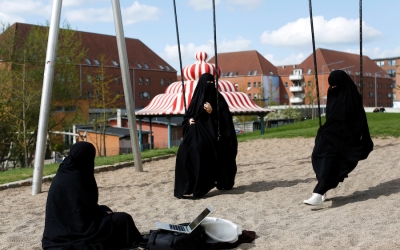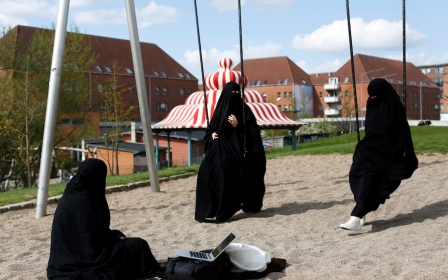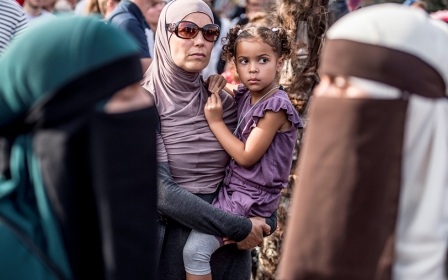Danish government accused of discrimination over 'ghetto' evictions
Residents of a Copenhagen neighbourhood labelled a “ghetto” by the Danish government have launched a legal campaign to fight eviction from their homes.
The group of residents from Mjolnerparken argue that the designation is discriminatory under EU and human rights law because the criteria that the government uses includes assessing whether more than half of the population of an area is from a “non-western” background.
In a statement in support of the residents, Almen Modstand, a nationwide tenants' network, said: “We cannot accept the threat of being forced from our homes and witness our loved communities being ripped apart on the basis of discrimination; simply because of who we are and because our neighbourhoods are also home to low-income, ethnic minorities.
“We have a vision of a Denmark that is inclusive to all, no matter skin colour, income, or neighbourhood."
More than 200 out of 510 public housing apartments in the area, which is home to about 1,600 people, are due to be sold off as part of controversial government plans to change the character of urban neighbourhoods with high levels of deprivation, social problems and crime which are officially listed as “ghettos”.
New MEE newsletter: Jerusalem Dispatch
Sign up to get the latest insights and analysis on Israel-Palestine, alongside Turkey Unpacked and other MEE newsletters
Such communities are also home to the majority of Denmark's ethnic minority population, many of whom are from Muslim backgrounds and the government has faced accusations of discrimination and racism since introducing a package of measures targeting ghetto neighbourhoods in 2018.
About 82 percent of Mjolnerparken residents are immigrants or the children of immigrants, according to the latest figures, with many from Lebanese, Iraqi and Somali backgrounds.
'Danish values'
The measures, which the government says are necessary to encourage integration, include compelling infants from ethnic minority backgrounds to spend at least 25 hours a week in state childcare in order to be taught “Danish values” and tougher punishments for crimes committed in ghetto areas.
“Denmark enjoys a reputation around the world as an egalitarian country with strong social and economic systems. These concepts are eroded by the ‘Ghetto Package’ and this eviction plan,” said Susheela Math of Open Society Justice Initiative, which is supporting the residents' legal challenge.
“Not only are these residents stigmatised as inhabitants of a ‘ghetto’ - with all its connotations - they are also facing losing their homes. The centrepiece of the law is a state-made label of ‘non-western background,’ which can apply even to individuals born and raised in Denmark.”
The specific focus of the legal challenge is a measure within the package which requires the government to reduce public housing in areas deemed to be “tough ghettoes” by 40 percent by 2030.
“Tough ghettoes” are areas that have been defined as ghettoes for four years or more according to a list of neighbourhoods published by the Ministry of Transport, Building and Housing since 2010.
The most recent list, published in December 2019, lists 28 areas including six in Copenhagen, the Danish capital, and others in cities including Odense and Aarhus.
'A home is a human right'
According to campaigners, thousands of people across Denmark are threatened with eviction as a consequence of the law.
"We all value our home. We value our community and respect each other. But as a result of the so-called 'Ghetto Laws', we and other groups in Denmark might be evicted in the near future,” said Susanne Poulsen, a Mj0lnerparken resident.
“A home is a human right. This isn't only a threat to us, but also to our children."
The legal challenge hinges on the government's use of the percentage of the population from a “non-western background” as a measure in determining if an area is a ghetto. The measure covers first-generation immigrants and their Danish-born children and lawyers say it is based on race, religion and ethnic origin.
“The use of ‘non-western background’ as a criterion in the law on common housing is closely connected to residents’ racial, ethnic and national origin,” said Eddie Omar Rosenberg Khawaja, a lawyer at Jacobsen & Khawaja which is representing the residents.
“The plaintiffs, many of whom have lived in Mjolnerparken for decades, are going to lose their homes based on this criterion. This is discriminatory and violates their human rights.”
Announcing plans to sell off the Mjolnerparken homes in February, Bo-Vita, the company responsible for subsidised housing in the neighbourhood, said proceeds from the sale of the homes would be used to relocate displaced residents and build subsidised housing elsewhere in the city.
Middle East Eye has contacted the Danish Ministry of Transport, Building and Housing for comment.
Middle East Eye delivers independent and unrivalled coverage and analysis of the Middle East, North Africa and beyond. To learn more about republishing this content and the associated fees, please fill out this form. More about MEE can be found here.





